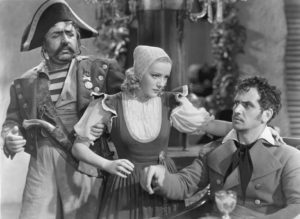Buccaneer
Rating: ***
Origin: USA, 1938
Director: Cecil B. DeMille
Source: Olive DVD

This may be the only patriotic American pirate movie with a president in it, except for the remake filmed twenty years later. It’s based on the 1930 novel Lafitte the Pirate by Lyle Saxon, which I haven’t read, but if its plot has as little to do with history as this movie, Mr. Saxon has a lot to answer for. High concept: “Jean Lafitte helps ol’ Andy Jackson beat the British at the Battle of New Orleans.” This is not only a sure-fire can’t-miss basis for a Hollywood movie, it even actually happened. Just nothing like the way it’s depicted in The Buccaneer.
All right, so this is claptrap—but is it entertaining claptrap? In the main, it is, mostly because it knows it’s claptrap and therefore doesn’t take itself very seriously. This is a relief, frankly, after DeMille’s pompous and overblown Cleopatra and The Crusades, and shows he still knew how to tell a story with a light hand. But this is also flag-waving American history as told in the mid-twentieth-century, and therefore more about America’s idea of itself than what really occurred.
Jean Lafitte, the titular buccaneer, is played by Fredric March, one of the most respected leading men of the 1930s, acclaimed in roles both dramatic and romantic. His Captain Lafitte is a dark and curly-haired dandy who mocks respectability in a suave French accent while secretly aspiring to gentility, more an unorthodox free-trading entrepreneur than an unscrupulous cutthroat. The real Lafitte was the last of the Caribbean pirates, a double-dealing scoundrel with no principles to speak of—but that won’t do for DeMille, who must have a heroic privateer who respects the American flag and will raid only foreign shipping. Claptrap, but it provides the film some early conflict between Lafitte and a captain who disobeys his orders and sinks an American ship. This gives March a chance to conduct a boarding action, show his piratical grit, and then turn around and display his decency by saving the life of a captive, a Dutch woman named Gretchen, played for laughs by Franciska Gaal. She’s not the only funny-foreigner character in the film: for DeMille, the melting-pot nature of New Orleans is an opportunity for a parade of cartoon ethnics and racial stereotypes. This is irksome, hard to forgive, and unfunny, with one exception: the ursine Akim Tamiroff (and his mighty mustache) in the role of Dominique Youx, a former Napoleonic cannoneer in the service of Lafitte. (True story.) Tamiroff becomes Gretchen’s protector, and his blustering ebullience is one of the chief pleasures of this film.
Other pleasures include the re-creation of Lafitte’s legendary pirate haven of Barataria, the battalion of buccaneers gliding through the bayous on their long, narrow flatboats, the swaggering and smirking Anthony Quinn as Lafitte’s shady lieutenant (his presence seemingly statutorily required in every pirate movie), and best of all, the dawning realization that the so-serious Fredric March has a genuine talent for sly comedy.
Over an hour into the movie the other major historical figure finally appears: Hugh Sothern as General Andrew Jackson, in a fun over-the-top portrayal of Old Hickory, outdone only by his aide, the even-more-cartoonish frontiersman Ezra Peavey (Walter Brennan, in an early triumph). Brennan even out-hams Akim Tamiroff. Anyway, the British are coming! After a tense negotiation held at mutual gunpoint, Jackson and the outlawed Lafitte join forces—once Lafitte slays a British-paid traitor in a fine cutlass duel and frees his captive men from prison in the nick of time.
And then the Battle of New Orleans is on! In the big finale DeMille reminds us that, if nothing else, that son of a bitch sure knew how to set up a shot. Lafitte and his men are given the critical center of the line of defense, whereas historically they held the extreme left flank, but what the hell: it’s Hollywood. Flags wave, redcoats marching to skirling bagpipes are no match for Jackson’s squirrel hunters and Napoleon’s cannoneer, and America is saved from perfidious Albion. So it’s a happy ending for everyone, right? Well, not so much, because pirates. No spoilers here: see it for yourself.